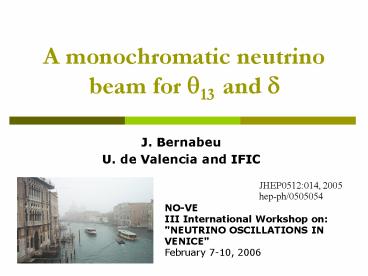A monochromatic neutrino beam for ?13 and ? - PowerPoint PPT Presentation
Title:
A monochromatic neutrino beam for ?13 and ?
Description:
A Dy atom with only one 1s electron left would still yield more than 40% of the ... In these conditions, experiment needs a counting rate detector of e's and 's only ... – PowerPoint PPT presentation
Number of Views:22
Avg rating:3.0/5.0
Title: A monochromatic neutrino beam for ?13 and ?
1
A monochromatic neutrino beam for ?13 and ?
- J. Bernabeu
- U. de Valencia and IFIC
JHEP0512014, 2005 hep-ph/0505054
NO-VEIII International Workshop on"NEUTRINO
OSCILLATIONS IN VENICE" February 7-10, 2006
2
A monochromatic neutrino beam for ?13 and ?
- What is known, what is unknown
- Interest of energy dependence in neutrino
oscillations - Gamow-Teller resonance in electron capture ?
Definite neutrino energy - Neutrino flux in LAB frame
- Physics reach
- Feasibility and prospects
3
What is known, what is unknown
- Neutrino flavour oscillations
?
Absolute neutrino masses ? ? 3 H beta decay
- Form of the mass spectrum
- Matter effect in neutrino
- propagation
Majorana neutrinos ? ? 0??? masses and phases
4
Interest of energy dependence in neutrino
oscillations
After atmospheric and solar discoveries and
accelerator and reactor measurements ? ?13 , d
CP violation accessible in appearance experiments
Appearance probability
Ue3 gives the strength of P(ne??µ)
d acts as a phase shift
5
Interest of energy dependence in neutrino
oscillations
- CP violation
CPT invariance CP violation T non-invariance
No Absorptive part ? Hermitian Hamiltonian ? CP
odd T odd is an odd function of time L !
In vacuum neutrino oscillations ? L/E dependence,
so
This suggest the idea of a monochromatic neutrino
beam to separate d and Ue3 by energy
dependence!
6
Neutrinos from electron capture
How can we obtain a monochromatic neutrino beam?
Electron capture
boost
Forward direction
2 body decay! ? a single discrete energy if a
single final nuclear level is populated
Flux
Branching ratio
From the single energy e--capture neutrino
spectrum, we can get a pure and monochromatic
beam by accelerating ec-unstable ions
7
Implementation
The facility would require a different approach
to acceleration and storage of the ion beam
compared to the standard beta-beam, as the atomic
electrons of the ions cannot be fully stripped.
Partly charged ions have a short vacuum
life-time. The isotopes we will discuss have to
have a half-life vacuum half-life few
minutes.
For the rest, setup similar to that of a
beta-beam.
- Brief recall
- Ions produced at EURISOL
- Accelerated by the SPS
- Stored in a storage ring, straight sections
point to detector
8
An idea whose time has arrived !
The breakthrough came thanks to the recent
discovery of isotopes with half-lives of a few
minutes or less, which decay mainly through
electron capture to a single Gamow-Teller
resonance in a super allowed transition.
9
Ion Candidates
Ions must have a mean life short enough to
allow them to decay in the storage ring before
they lose its electron. The recent discovery of
nuclei that decay fast enough through electron
capture opens a window for real experiments. We
want to have an initial neutrino energy E0 low
so that a given E2gE0 implies a high ? and
then, for a high g, higher neutrino flux.
10
Physics reach
Setup
5 years g 90 (close to minimum
energy above threshold) 5 years g 195
(maximum achievable at SPS)
1018 ions/year
440 kton water ckov detector
OR appropriate changes If higher production
rates
Distance 130 km (CERN-Frejus)
Appearance Disappearance
11
Preliminary results for two energies
130 km
12
Fit of ?13 , ? from statistical distribution
The principle of an energy dependent measurements
is working and a window is open to the
discovery of CP violation
13
Exclusion plot sensitivity
Total running time 10 years... Impressive!!
Significant even at 1o
14
Access to a precise value of ?
- 1. Enter into the second oscillation in E/L,
where the sensitivity to ? is higher ? At
fixed E, move to Canfranc L650 Km - in study at present
- 2. Check that the phase
- shift measured is the
- CP phase ? combine
- EC ? with ?- (6He)
- preliminary
650 Km
15
Feasibility
- Acceleration and storage of partly charged ions
- - Experience at GSI and the calculations for
the decay ring yield less than 5 of stripping
losses per minute - - A Dy atom with only one 1s electron left
would still yield more than 40 of the yield of
the neutral Dy atom - ? with an isotope having an EC half-life of 1
minute, a source rate of 1013 ions per second, a
rate of 1018 ?s along one of the straight
sections could be achieved - (M. Lindroos)
- - A new effort is on its way to re-visit the
rare-earth region on the nuclear cart and measure
the EC properties of possible candidates. The
best a half life of less than 1 min with an EC
decay feeding one single nuclear level.
16
Physics Prospects
- Most important is to determine the full physics
reach for oscillation physics with a
monochromatic neutrino beam it would allow to
concentrate the intensity in the most interesting
point (s) in E/L - By fine tunning of the boosted neutrino
energy - By varying the baseline Canfranc?,
Frejus?, - a combination of the two Ls?
- By combining EC neutrinos with ?-
antineutrinos from 6He - . Comments
- - In these conditions, experiment needs a
counting rate detector of es and ?s only - - Realistic simulation including systematics
effects (1 ?) in the disappearance rate
17
TWO COMPLEMENTARY VISIONS OF THE WORLD
Thanks to my collaborators J.
Burguet-Castell C. Espinoza M. Lindroos































